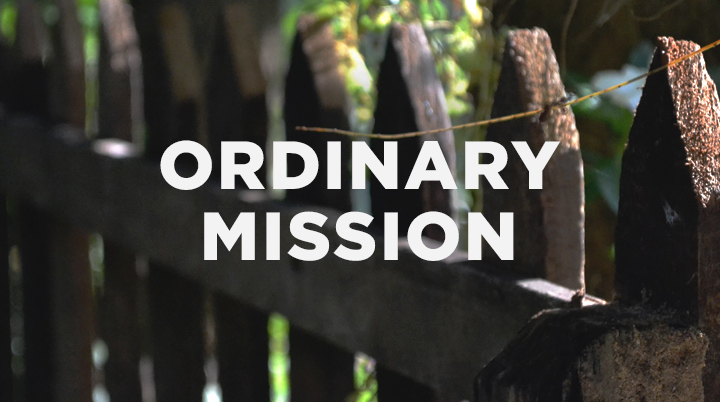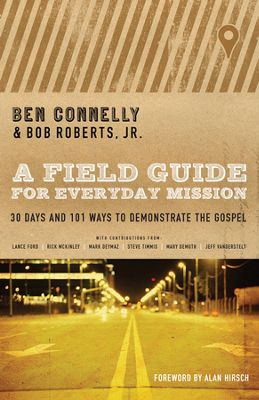Latest
-
Objections to the Christian Faith from the Unchurched and De-Churched
 Tue Dec 02, 2014
Tue Dec 02, 2014
by Resurgence -
Craig Groeschel: We Innovate for Jesus
 Tue Oct 14, 2014
Tue Oct 14, 2014
by Resurgence -
Mark Driscoll: Revelation
 Tue Oct 07, 2014
Tue Oct 07, 2014
by Resurgence -
RESURGENCE LEADERSHIP #034: JOHN PIPER, WHY I TRUST THE SCRIPTURES, PART 2
 Tue Sep 30, 2014
Tue Sep 30, 2014
by Resurgence -
Resurgence Leadership #033: John Piper, Why I Trust the Scriptures, Part 1
 Tue Sep 23, 2014
Tue Sep 23, 2014
by Resurgence

Archives
Ordinary People, Ordinary Mission

There is great appeal in pursuing exotic or “extraordinary” mission. But the Bible calls us to look a little closer as we live out Jesus’ mission: those in need and our neighbors.
“Africa!” two or three voices rang out. Then it was silent.
I had just asked a couple hundred folks in a Sunday service, “What do you think of when you think of missions?” “Africa!” was the lone response.
“Anything else?” More silence. The exact same interchange happened at the second service. Different people, but exactly the same question, single answer, same follow-up, same silence. “Missions = Africa.” Exclusively.
Two Sides of the Same Coin
There is great appeal in pursuing the “extraordinary” (in the literal sense—“outside the ordinary”) when it comes to mission. That’s why “Africa” is an easy thought: it’s glamorous. It makes for great stories. And the impact can be tangible, even measurable.
But closer than Africa, the Bible displays two primary groups of people that God sends us to as we live out his mission: those in need and our neighbors.
Jesus’ brother James sums up both well: “Religion that is pure and undefiled before God, the Father, is this: to visit orphans and widows in their affliction, and to keep oneself unstained from the world” (James 1:27). And a few verses later, “If you really fulfill the royal law according to the Scripture, ‘You shall love your neighbor as yourself,’ you are doing well” (James 2:8).
From Genesis to Revelation, God often uses his ordinary people in his work of redeeming other ordinary people.
It seems that many Christians often have an easier time with one of those commands or the other. We’ll pursue neighbors at the expense of those in need, or those in need at the expense of our neighbors. Or if we’re really honest, some of us are uncomfortable or scared of mission altogether, so we pursue neither.
The problem is that God doesn’t make these distinctions. From Genesis to Revelation, God often uses his ordinary people in his work of redeeming other ordinary people. Wherever we live, we have an everyday mission field, comprised of both our neighbors and those in need. But living on mission in each of those groups takes different types of intentionality.
It’s Hard to Love Our Neighbors
The gospel is divisive. As the saying goes, “Never talk about religion or politics.” Many relationships change when faith enters a conversation. Our client might be offended and find a new provider. That classmate might think we’re weird and sit next to someone else tomorrow. Our neighbor might vacate his half-mowed lawn and scurry away until we go back inside. In fact, God promises responses like this: “For the word of the cross is folly to those who are perishing, but to us who are being saved it is the power of God” (1 Cor. 1:18).
Wherever we live, we have an everyday mission field.
It’s even more difficult if we’ve lived near or worked with someone for many years. “Love Your Neighbor Sundays” see my church worshiping God by throwing block parties, inviting others over, pulling out grills, baking cookies for hermits, and so forth. After living next to their neighbors for a decade, one couple was embarrassed when their first LYN Sunday came around. The extent of their relationship was a “what’s-up?” nod exchanged between the men as they got in their cars every morning.
The couple worked through their fears and shame, and their first act of loving their neighbors was ringing the doorbell, armed with cookies and wine. And repenting: “We’ve lived next to you for years, but don’t even know you. We’d like to be better neighbors; will you give us a chance?” Today they have regular conversation and even talk about faith. And that first step wasn’t extraordinary, but it was hard. Mission to neighbors is difficult.
It’s Hard to Love Those In Need
Loving those in need is equally difficult because it often asks us to go out of our way. Unless we work in certain jobs, it’s unlikely that we spend regular, quality time hanging out with an orphan, tutoring underprivileged kids, playing games at a nursing home, or visiting hospitals or prisons.
Jesus calls similar people “the least of these my brothers” (Matt. 25:40). Too often we consider the first half of that label while missing the second half: to society and likely even to many of us, widows, orphans, prisoners, the elderly, the sick, the homeless, prostitutes, and refugees, are “the least.”
Loving our neighbors is about demonstrating the gospel through normal relationships and rhythms of life.
They may be low-income, less-clean, and “lost” in many senses of the word. But Jesus also calls them “my brothers.” There’s inherent worth in their neediness; there’s dignity in that they’re created in the same marred image of God as we are. Their physical condition reflects the spiritual condition of every human: we need salvation.
A far cry from an annual trip across the Atlantic, loving our neighbors is about demonstrating the gospel through normal relationships and rhythms of life, where we naturally exist. Loving those in need often asks us to go out of our way, lay down our lives for the “least of these my brothers,” and depart from our natural rhythms to go into an area we don’t naturally exist, for the sake of the gospel. But the goal in God’s mission is always the same: “make disciples.”
Which side do you pursue better? Who are the people God has sent you to? We can’t ignore these ordinary mission fields, because these are the two groups of people to whom God has sent us, every day.
For related material, check out A Field Guide for Everyday Mission, by Ben Connelly & Bob Roberts Jr. Find free resources and preorders at everydaymission.net.
